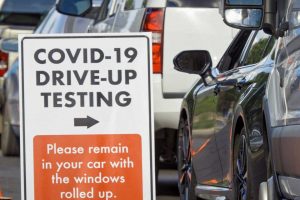‘Creates more problems than it’s worth’: CDC eases COVID-19 testing recommendations for vaccinated people

Not only can vaccinated people mostly avoid masks, they can limit testing for COVID-19.
The Centers for Disease Control and Prevention this week said vaccinated people without symptoms mostly don’t need to get tested even if exposed to the virus. People who are fully vaccinated and don’t have symptoms also should not be randomly screened, the CDC said.
The CDC’s loosening of masking restrictions and updated testing guidance comes as large private employers and universities still routinely test vaccinated employees and students.
People still can become infected with COVID-19 after getting vaccinated, but they are much less likely to get sick and also less likely to pass the virus to others. Experts say the agency’s updated testing recommendations are consistent with past guidance and are designed to avoid unnecessary testing and disruptions.
Jennifer Nuzzo, a senior scholar at the Johns Hopkins Center for Health Security, said the probability that vaccinated people will test positive is low. Similarly, vaccinated people without symptoms who test positive have an “extremely low” likelihood of transmitting COVID-19 to others, Nuzzo said.
‘What if it was your kid?’ Parents of young children feel forgotten as CDC loosens mask restrictions
“We try not to test people who have an extremely low probability of infection,” said Nuzzo, an associate professor at the Johns Hopkins School of Public Health. “It probably creates more problems than it’s worth.”
The CDC still recommends people who show symptoms of COVID-19 should get tested, Also, vaccinated people without symptoms should get tested if they are in a prison or a homeless shelter. All health-care workers and residents of nursing homes with an active outbreak also must be routinely tested until no new cases are detected for two weeks.
The stricter testing recommendations for prisons and long-term care facilities, even if staffs are fully vaccinated, is necessary because they are higher-risk facilities, experts say.
(Photo: Getty Images)
“There is a reason we want testing in those situations,” said Dr. Eric Blank, the Association of Public Health Laboratories’ chief program officer. “If there is an exposure, you’ll want to find out if it came from the home, a visitor, or is that a true breakthrough?”
Blank said the need for testing is much less urgent in lower-risk settings such as universities, private businesses or even professional sports teams. People are considered protected two weeks after they complete their final vaccine dose.
Rapid tests used to screen large numbers of people in a setting with few cases might be less sensitive. And if a person tests positive on a rapid antigen test, that person might need to take a lab-based PCR test that could keep a person out or work for a couple of days to verify results, Blank said.
Opinion: Vaccinated? CDC says it’s OK to ditch masks. But it’s not OK to harass people wearing them.
With this week’s updated recommendations, the CDC said there’s a growing body of evidence that vaccinated people are protected and less likely to pass the virus to others.
“The bottom line is if you are vaccinated – I know it’s a little harsh – but it seems like a waste of time and money,” Blank said. “We consider them protected, so what’s the point of screening?”
This week, three coaches, four support staff and shortstop Gleyber Torres of the New York Yankees tested positive for COVID-19 — even though all had been vaccinated.
When asked Thursday about the Yankees’ outbreak, CDC Director Dr. Rochelle Walensky said, “We obviously need to learn more about that situation”
Dr. Geoffrey Baird, interim chair of the University of Washington’s Department of Laboratory Medicine, said mask wearing, distancing and testing help lower COVID-19 risk. The CDC’s updated recommendations reflect the lower risk across the nation now, but he warned the risk has not been eliminated.
“It’s just that the risk is much lower now and the consequences are much more benign,” Baird said. “Nothing is 100% effective.”
Source: Read Full Article

